 |
|
Hi, you're in the Archives, April 2008 - Part 2 |
|
|
|
|
 |
| |
April
24, 2008 |
|
 |
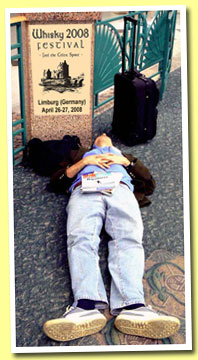 |
WE
ARE SORRY
There
won't be any updates of Whiskyfun
from tomorrow until, say Tuesday
or Wednesday, because:
1. We're very busy with work (no,
this isn't our job)
2. It's the Whisky Fair in Limburg
and 'of course' we'll be there.
3. We ran short of tasting notes
(because of 1.)
4. Spring is in the air.
5. We're moving our whisky cellar.
6. There's a lost episode of Inspektor
Derrick on TV.
7. We are a little tired (which
may have something to do with one
or two of the above reasons)..
Oh, and we're even more sorry about
the fact that we don't manage to
answer all our emails these days
(especially related to fake whiskies.)
If you've been expecting an answer
since quite some time now, our sincerest
apologies, we'll try to reply to
you as soon as the above poor
excuses valid reasons are
over. Talk to you later. |
CONCERT
REVIEW by Nick Morgan
MAVIS STAPLES
The Barbican, London, April 15th 2008 |
 |
Few
singers can have a greater right to
trade off the memory of Dr Martin
Luther King (whose name, sadly, is
often taken in vain by the unworthy)
than Mavis
Staples, the voice behind
the sixties gospel-turned-soul band,
the Staples Singers. They did, after
all, provide the soundtrack for the
civil rights movement in the United
States in the years preceding and
immediately after Dr King’s
assassination in Memphis one April
day forty years ago. And having joined
Stax records as it tried to redefine
itself as the label of the Black Power
movement, they went on to become Number
1 sellers. |
| Pop
Staples, the Mississippi-born patriarch
of the band who had been touched by
the blues of the likes of Charley
Patton as a child ("I was a Christian
man. I figured blues wasn't the right
field for me”) was an intimate
of the Doctor. After first hearing
him speak in 1963 he told his children
(also his band) "If he can preach
it, we can sing it.". And they
did. This is the spirit that’s
conjured up in Ms Staples’ occasionally
masterly 2007 album We’ll Never
Turn Back, produced by and featuring
Ry Cooder, along with son Joachim,
drumming giant Jim Keltner and the
Ladysmith Black Mambazo choir. And
its success, coupled with the anniversary
of Dr King’s murder, makes it
a timely opportunity to tour. |
| I
think they’re still selling
tickets, but the Barbican is almost
full, and the evening is kicked off
with incredible energy by Jhelisa
Anderson and her band, featuring
young British pianist Robert
Mitchell. I would hesitate to
find an easy comparison for her eclectic
style – I thought most of Cassandra
Wilson, but only just – but
she gave as powerful a start to a
gig as I can recall for a long time.
Maybe that’s because she knew
what was coming. You could feel the
anticipation in the hall melt away
when the MC announced “Well,
we nearly cancelled tonight’s
show due to Mavis Staples’ illness,
but she insisted on playing”.
Ms Staples was suffering from a bad
throat infection, and was clearly
very, very unwell. Her band looked
on anxiously through the night, and
somewhat disapprovingly, and it became
clear from the sheepish grins that
the tale of her throwing a fit when
they tried to lock her in the hotel
bedroom was not too far from the truth.
And it’s an interesting dilemma
– we’ve paid our quids
to see a show, so should we be given
less than full value? And should Ms
Staples be risking her health (and
voice) further by performing when
she’s ill? |
| Well
the dice were thrown and we all had
to make the best of it. Ms Staples’
voice was firing for the most part
at about thirty per cent (although
the fact that she did manage “R
E S P E” before choking on the
remaining two letters in ‘Respect
yourself’ might, from a purely
statistical perspective, have put
her voice on around seventy per cent).
But her spirit and soul were peaking
at around one hundred and eighty,
and there wasn’t even a cynic
like me in the house who didn’t
melt just a little bit when she explained
“I had to come out tonight,
for you. You’re my people. You’re
my people’. After which she
could really do no wrong. |
 |
| So
she coughed and spluttered her way
through new songs like ‘’Eyes
on the prize’, and ‘Down
in Mississippi’ (born in Chicago
her childhood was divided between
the city and the Delta), and classics
like Steven Still’s ‘For
what it’s worth’, ‘The
weight’ (the Staples Singers
performed with the Band for The Last
Waltz), ‘Why (am I treated so
bad)’, ‘Freedom’s
Highway’, and their number one
hit ‘I’ll take you there’.
That ended the show with a standing
ovation that brought Ms Staples to
tears. Surprisingly she returned for
‘We shall not be moved’
(more tears, but those could have
been caused by the Barbican’s
terrible singing) and finally from
the new album ‘Turn me around’.
|
| It
was a show of great spirit, but would
not have been pulled off but for the
tight band behind her (her backing
singers, including sister Yvonne looked
frankly unimpressed by the whole thing)
led by guitarist Rick
Holmstrom, who, as they say, stepped
up to the plate to try and fill some
of the gaps left by Ms Staples’
ailing voice. |
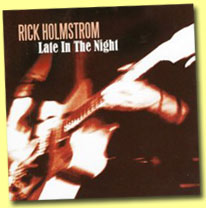 |
He’s
a fantastic rootsy and gutsy blues
player with echoes from Ry Cooder
to Marc Ribot, but with a sound
all of his own.With drummer (and Tom
Waits veteran) Stephen
Hodges and bassist Jeff
Turmes (who both play on Holmstrom’s
most recent and highly-recommended
album Late in the Night) they carried
the night, taking their own ten-minute
spot (whilst the Misses Staples and
Co had a sit down and ‘bit of
a rest’ at the back of the stage)
to play ‘Tutweiler’ from
Holmstrom’s album. And between
every song it was Holmstrom who talked
to Ms Staples, asked her if she could
carry on, and suggested songs she
might like to try. |
|
An altogether impressive performance
that made a potentially disastrous
evening most enjoyable. - Nick
Morgan (photographs by Kate) |
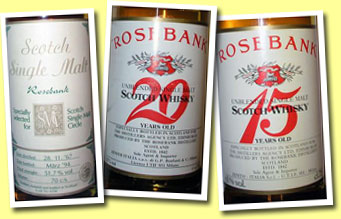 |
TASTING
– THREE OLD ROSEBANKS
Summer is around the corner... Well,
not quite, but time to try three
Rosebanks - but old and punchy (and
legendary) ones. So much for the
Lowlanders’ lightness. (thanks,
Konstantin) |
Rosebank
1967/1994 (51.7%, Scotch Single Malt
Circle, cask #4398)
 Colour: full gold. Nose: discrete
and almost shy at first nosing, but
things keep improving after a few
seconds. Minutes actually... First
there’s some unusual smoky notes,
like a mixture of wood and coal, then
it’s the leather and plain wood
that arise (and cigar box), then pu-erh
tea, then pure and plain peat smoke...
The our beloved camphor and eucalyptus...
Still not an ‘aromatic monster’
but water should probably help here.
With water: not much changes, except
for added meaty hints. Ham. Mouth(neat):
wohoho, this is another story, even
when undiluted. Big, big notes of
crystallised citrus fruits (all of
them), superb notes of quince jelly
(and eau-de-vie – delightful),
then all kinds of waxy and resinous
touches, then an avalanche of various
spices... All that with the citrus
always present. Admirable palate and
no need of water here, I’m sure.
Finish: as long as Cleopatra’s
nose (wtf?), always on lemons and
oranges, with also a little ginger
from the wood – a perfect wood,
at that – and then loads of
pepper. Well, this is a stunner of
a Rosebank. Comments: a big, big Rosebank,
extremely concentrated. Unusual peatiness
on the nose but none on the palate.
SGP:663 – 92 points.
Colour: full gold. Nose: discrete
and almost shy at first nosing, but
things keep improving after a few
seconds. Minutes actually... First
there’s some unusual smoky notes,
like a mixture of wood and coal, then
it’s the leather and plain wood
that arise (and cigar box), then pu-erh
tea, then pure and plain peat smoke...
The our beloved camphor and eucalyptus...
Still not an ‘aromatic monster’
but water should probably help here.
With water: not much changes, except
for added meaty hints. Ham. Mouth(neat):
wohoho, this is another story, even
when undiluted. Big, big notes of
crystallised citrus fruits (all of
them), superb notes of quince jelly
(and eau-de-vie – delightful),
then all kinds of waxy and resinous
touches, then an avalanche of various
spices... All that with the citrus
always present. Admirable palate and
no need of water here, I’m sure.
Finish: as long as Cleopatra’s
nose (wtf?), always on lemons and
oranges, with also a little ginger
from the wood – a perfect wood,
at that – and then loads of
pepper. Well, this is a stunner of
a Rosebank. Comments: a big, big Rosebank,
extremely concentrated. Unusual peatiness
on the nose but none on the palate.
SGP:663 – 92 points. |
Rosebank
20 yo (57%, OB, Distillers Agency,
Zenith, clear glass, 2580 bottles)
 Colour: pale gold. Nose: just
like the 1967, it’s a bit shy
at first nosing, but then it gets
even more on coal smoke and shoe polish,
like many of the old dumpies by Cadenhead.
Also more kumquats and lemon marmalade,
but I’m sure water will be needed
again. So, with water: plain shoe
polish! Reminds me of my days in the
army – don’t ask me why
I like shoe polish then. Faint whiffs
of wet dogs (not army dogs). Mouth
(neat): fantabulous attack, but not
one that would please everyone. Thick
and oily, starting extremely tarry
and almost metallic (nah, this bottle
had a cork stopper), with the lemony
notes starting to act on your tongue
like myriads of mini-explosions (err,
or something like that). Then it’s
kumquats, bitter oranges, mastic,
peanut butter, lemon-flavoured toffee,
crystallised fruits (all kinds)...
Wowie! With water: even better, even
more complex. Gorgeous whisky. Finish:
we haven’t gotten all day, have
we? Comments: a legendary bottle,
an ode to the Lowlands of Scotland
(don’t be silly, Serge.) SGP:662
– 93 points.
Colour: pale gold. Nose: just
like the 1967, it’s a bit shy
at first nosing, but then it gets
even more on coal smoke and shoe polish,
like many of the old dumpies by Cadenhead.
Also more kumquats and lemon marmalade,
but I’m sure water will be needed
again. So, with water: plain shoe
polish! Reminds me of my days in the
army – don’t ask me why
I like shoe polish then. Faint whiffs
of wet dogs (not army dogs). Mouth
(neat): fantabulous attack, but not
one that would please everyone. Thick
and oily, starting extremely tarry
and almost metallic (nah, this bottle
had a cork stopper), with the lemony
notes starting to act on your tongue
like myriads of mini-explosions (err,
or something like that). Then it’s
kumquats, bitter oranges, mastic,
peanut butter, lemon-flavoured toffee,
crystallised fruits (all kinds)...
Wowie! With water: even better, even
more complex. Gorgeous whisky. Finish:
we haven’t gotten all day, have
we? Comments: a legendary bottle,
an ode to the Lowlands of Scotland
(don’t be silly, Serge.) SGP:662
– 93 points. |
Rosebank
15 yo (61%, OB, Distillers Agency,
Zenith, clear glass, 2400 bottles)
 Colour: pale gold. Nose: same as the
20yo in style but even less expressive
when neat. Almost closed, except for
hints of rubbed lemon skin. Lets wait...
Well, even with the addition of water,
this one remains rather closed and
grassy. Rough. Mouth (neat): we’re
not too far from the 20yo as far as
the profile is concerned but this
is much more aggressive, kind of dirty
(dust), very bitter (like some herbs)...
Water is obligatory here. With water:
ah, that worked this time, but it
never gets as complex as the 20yo.
Rounder, more candied, more citrusy,
also saltier... Finish: long, on lemon
marmalade and something like chlorophyll
chewing-gum. Comments: very, very
good but not legendary I think. Lacks
a little more ‘sexiness’.
SGP:451 - 86 points.
Colour: pale gold. Nose: same as the
20yo in style but even less expressive
when neat. Almost closed, except for
hints of rubbed lemon skin. Lets wait...
Well, even with the addition of water,
this one remains rather closed and
grassy. Rough. Mouth (neat): we’re
not too far from the 20yo as far as
the profile is concerned but this
is much more aggressive, kind of dirty
(dust), very bitter (like some herbs)...
Water is obligatory here. With water:
ah, that worked this time, but it
never gets as complex as the 20yo.
Rounder, more candied, more citrusy,
also saltier... Finish: long, on lemon
marmalade and something like chlorophyll
chewing-gum. Comments: very, very
good but not legendary I think. Lacks
a little more ‘sexiness’.
SGP:451 - 86 points. |
| |
April
23, 2008 |
|
 |
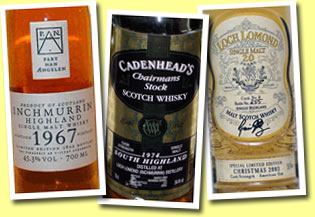 |
TASTING
– TWO INCHMURRINS
'for
Jean-Marie'
In
case you don’t know, Inchmurrin
is one of the variants of single
malt whisky they make at Loch Lomond
Distillery. Usually not a blue chip,
but you never know, and some older
casks have quite a reputation. |
Inchmurrin
34 yo 1967/2001 (45.3%, OB for Sweden,
Part Nan Angelen, 1800 bottles)
 Colour: gold. Nose: hey, this is very
nice! Starts very flowery ala Balvenie
(yellow flowers, nectar), but also
with quite some smoke and something
slightly medicinal (antiseptic). Also
beautiful notes of hot butter (not
butyric), wine-poached pears, almond
milk, avocado... Something faintly
resinous as well... All that is very
aromatic, and after quite a while
it’s the smoke that prevails.
Unexpected, really. Mouth: did I say
unexpected? This starts all on oranges,
ripe apricots, something camphory
(cough syrup), mint... Then sultanas
and roasted peanuts, maple syrup,
gingerbread, coffee (not unlike Irish
coffee). Keeps developing on spices,
mostly cloves and cinnamon. What a
surprise! Finish: not the longest
ever but very clean, candied, with
absolutely no excessive oak despite
the old age. Comments: keyword ‘surprise’
– and perfect balance. SGP:554
– 90 points (not just
because it’s a surprise, it’s
really worth 90 in my book).
Colour: gold. Nose: hey, this is very
nice! Starts very flowery ala Balvenie
(yellow flowers, nectar), but also
with quite some smoke and something
slightly medicinal (antiseptic). Also
beautiful notes of hot butter (not
butyric), wine-poached pears, almond
milk, avocado... Something faintly
resinous as well... All that is very
aromatic, and after quite a while
it’s the smoke that prevails.
Unexpected, really. Mouth: did I say
unexpected? This starts all on oranges,
ripe apricots, something camphory
(cough syrup), mint... Then sultanas
and roasted peanuts, maple syrup,
gingerbread, coffee (not unlike Irish
coffee). Keeps developing on spices,
mostly cloves and cinnamon. What a
surprise! Finish: not the longest
ever but very clean, candied, with
absolutely no excessive oak despite
the old age. Comments: keyword ‘surprise’
– and perfect balance. SGP:554
– 90 points (not just
because it’s a surprise, it’s
really worth 90 in my book). |
Inchmurrin
1974/2003 (54.4%, Cadenhead’s
Chairman's Stock, 210 bottles)
 Colour: pale gold. Nose: less cask
influence but a bigger sharpness.
Not really flowery this time at first
nosing, rather a ‘greener’
spirit, grassier and waxier. Less
sexy in a certain way but it’s
still very good spirit. Quite some
smoke again, with a rather big oakiness
coming through after a moment. A little
austere but let’s try it with
water: yes, that works. Added notes
of praline, cappuccino, and nutmeg,
with also a little vanilla. Less green
and more rounded. Mouth (neat): punchy
but very drinkable at cask strength,
even if the high spirit gives it something
slightly too ‘pearish’.
Big oak and quite some pepper, I feel
this needs water like on the nose.
With water: excellent now. Still a
little simpler than the 1967 but perfectly
enjoyable. Ginger and all sorts of
spices, including big notes of cardamom.
Finish: rather long, a little more
on the oaky side (white pepper here)
but still pleasant. Comments: well,
it can’t be a surprise anymore,
thanks to the 1967, but this is very
good whisky again. SGP:362
– 86 points.
Colour: pale gold. Nose: less cask
influence but a bigger sharpness.
Not really flowery this time at first
nosing, rather a ‘greener’
spirit, grassier and waxier. Less
sexy in a certain way but it’s
still very good spirit. Quite some
smoke again, with a rather big oakiness
coming through after a moment. A little
austere but let’s try it with
water: yes, that works. Added notes
of praline, cappuccino, and nutmeg,
with also a little vanilla. Less green
and more rounded. Mouth (neat): punchy
but very drinkable at cask strength,
even if the high spirit gives it something
slightly too ‘pearish’.
Big oak and quite some pepper, I feel
this needs water like on the nose.
With water: excellent now. Still a
little simpler than the 1967 but perfectly
enjoyable. Ginger and all sorts of
spices, including big notes of cardamom.
Finish: rather long, a little more
on the oaky side (white pepper here)
but still pleasant. Comments: well,
it can’t be a surprise anymore,
thanks to the 1967, but this is very
good whisky again. SGP:362
– 86 points. |
And
also Loch
Lomond 20 yo (55%, OB, Limited Edition
for Xmas 2003, cask #8)  Colour: straw. Nose:
this is completely different, much
more on pears and porridge, feints,
wet paper, paraffin... Sort of pleasant
but in no way as classy as the Inchmurrins.
With water: even more porridgy! Grains,
grains and grains. Mouth (neat): softer
than expected, creamy, oily, rather
simple (orange drops, pear drops and
eucalyptus sweets), getting then a
little too hot – and oaky. With
water: mm, really resembles the famous
and shiny Loch Lomond ‘blue
label’ now, just with more oak
and a slightly bigger complexity.
Finish: medium long, peppery and prickly,
getting bitter. Comments: for lovers
of oaky porridge. SGP:360
– 73 points.
Colour: straw. Nose:
this is completely different, much
more on pears and porridge, feints,
wet paper, paraffin... Sort of pleasant
but in no way as classy as the Inchmurrins.
With water: even more porridgy! Grains,
grains and grains. Mouth (neat): softer
than expected, creamy, oily, rather
simple (orange drops, pear drops and
eucalyptus sweets), getting then a
little too hot – and oaky. With
water: mm, really resembles the famous
and shiny Loch Lomond ‘blue
label’ now, just with more oak
and a slightly bigger complexity.
Finish: medium long, peppery and prickly,
getting bitter. Comments: for lovers
of oaky porridge. SGP:360
– 73 points. |
| MUSIC
– Recommended listening.
The great, great Carla
Bley and her super
sextet plays Healing
Power.mp3 (from her 1987 album
'Sextet' - easy!). Watch Hiram Bullock's
guitar! And please buy Carla Bley's
music! |
 |
| |
April
22, 2008 |
|
 |
| TASTING
– THREE YOUNG BUNNAHABHAINS |
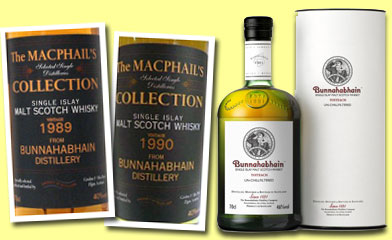 |
Bunnahabhain 1989 (40%, G&M MacPhail's
Collection, circa 2000)
 Colour: pale gold. Nose: very, very
close to the official 12yo that I’m
using as a benchmark, but softer,
more a ‘whispering’ bunny
when compared to the 12, that got
a bit bigger in recent years. Butter,
soft honey, hay and sultanas. Shy.
Mouth: same comments. Slight smokiness
but other than that it’s slightly
weakish. Finish: medium long, caramelly
and then a bit drying (cardboard).
Comments: not bad. SGP:341
– 74 points (the official
12 is more like 433 – 82).
Colour: pale gold. Nose: very, very
close to the official 12yo that I’m
using as a benchmark, but softer,
more a ‘whispering’ bunny
when compared to the 12, that got
a bit bigger in recent years. Butter,
soft honey, hay and sultanas. Shy.
Mouth: same comments. Slight smokiness
but other than that it’s slightly
weakish. Finish: medium long, caramelly
and then a bit drying (cardboard).
Comments: not bad. SGP:341
– 74 points (the official
12 is more like 433 – 82). |
Bunnahabhain
1990 (40%, G&M MacPhail's Collection,
circa 2003)  Colour: pale gold. Nose: this one
is somewhere between the 12 and the
1989. Same style, just more expressive
and thus more pleasant that the latter.
Mouth: closer to the 1989 on the palate
but again, a little bigger and more
flavourful. Raisins, coffee, fudge.
Finish: a little longer than the 1989,
less drying. Comments: more body,
more pleasure. Not a big dram, that
is. The 1991 at 45% is much better
than both the 1989 and 1990 in my
book (87). SGP:442 –
78 points.
Colour: pale gold. Nose: this one
is somewhere between the 12 and the
1989. Same style, just more expressive
and thus more pleasant that the latter.
Mouth: closer to the 1989 on the palate
but again, a little bigger and more
flavourful. Raisins, coffee, fudge.
Finish: a little longer than the 1989,
less drying. Comments: more body,
more pleasure. Not a big dram, that
is. The 1991 at 45% is much better
than both the 1989 and 1990 in my
book (87). SGP:442 –
78 points. |
Bunnahabhain
‘Toiteach’ (46%, OB, 2007)
 Toiteach means ‘smoky’
in Gaelic. I believe this is only
for the French market. Like the older
‘Moine’, I believe it’s
from the famous peaty batches they
made in 1997 for the ‘peatophiles’
(dixit the ever engaging John McLellan,
distillery manager). Colour: white
wine. Nose: fragrant but young and
simple at first nosing. Something
like peated pears, should that exist
(and why not, eh?) Totally flawless
but very simple because I’m
trying hard to find other aromas but
I just do not manage. Right, a little
sea air... Mouth: a little more complex
now. Ultra-clean, with less pearish
notes and more ripe apples, the whole
coated with peat smoke and fresh almonds
as well as a little salt. Finish:
zing, as simple and clean as peaty
whisky can get. Comments: good but
very simple I think, with something
that reminds me of some very good
gin. Would probably gain from longer
maturing, I like the regular 12 better,
it’s more complex. SGP:515
– 79 points.
Toiteach means ‘smoky’
in Gaelic. I believe this is only
for the French market. Like the older
‘Moine’, I believe it’s
from the famous peaty batches they
made in 1997 for the ‘peatophiles’
(dixit the ever engaging John McLellan,
distillery manager). Colour: white
wine. Nose: fragrant but young and
simple at first nosing. Something
like peated pears, should that exist
(and why not, eh?) Totally flawless
but very simple because I’m
trying hard to find other aromas but
I just do not manage. Right, a little
sea air... Mouth: a little more complex
now. Ultra-clean, with less pearish
notes and more ripe apples, the whole
coated with peat smoke and fresh almonds
as well as a little salt. Finish:
zing, as simple and clean as peaty
whisky can get. Comments: good but
very simple I think, with something
that reminds me of some very good
gin. Would probably gain from longer
maturing, I like the regular 12 better,
it’s more complex. SGP:515
– 79 points. |
| MUSIC
– Recommended listening.
This is very rare (but I have the
original 27cm!), it's Bernard
Peiffer playing Willow
weep for me.mp3 in 1952, at
the age of 30. What a fantastic
pianist this Frenchy was! Please
buy his music... |
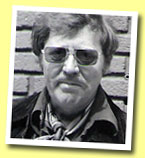 |
| |
April
21, 2008 |
|
 |
| TASTING
– FIVE 1989 BOWMORES |
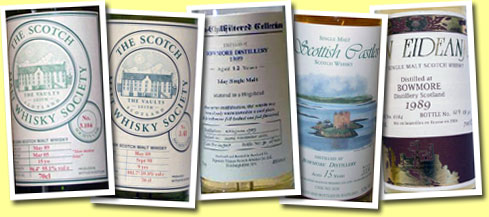 |
| 1989
was an important year at Bowmore,
as it seems that it’s in that
year that Suntory bought more shares
of Morrison Bowmore and decided to
invest much more money into improving
the general quality of the whisky
(thanks for confirming this, Misako).
As we already said, we believe that
it’s somewhere in 1989 that
the famous ‘lavender and geranium’
aromas (coined ‘FWP’ by
some friends, remember?) more or less
vanished from the spirit. Let’s
have a few now if you please –
too bad we don’t know of all
months of distilling. |
Bowmore
15 yo 1989/2005 (55.1%, Scotch Malt
Whisky Society, 3.104, 'Slow motion
Islay', distilled 05/'89)
 Colour: pale gold. Nose: spirity and
farmy, very rough, violent, medium
peated. Little ‘lavenderish’
notes, that is. With water: even feintier.
Mashed potatoes, butter, apple peeling.
Little added lavender notes I must
say. Mouth (neat): big but sugary,
weirdly meaty and bitter at the same
time. Bubblegum. Kind of dirty. With
water: a little better for a while
(pleasant saltiness) but there are
weird soapy notes indeed. No more
sweetness and a huge bitterness arising
(grape pips). Finish: long, raw, acrid...
Comments: I would not say it’s
flawed but it’s really hard
to enjoy. SGP:272 –
71 points.
Colour: pale gold. Nose: spirity and
farmy, very rough, violent, medium
peated. Little ‘lavenderish’
notes, that is. With water: even feintier.
Mashed potatoes, butter, apple peeling.
Little added lavender notes I must
say. Mouth (neat): big but sugary,
weirdly meaty and bitter at the same
time. Bubblegum. Kind of dirty. With
water: a little better for a while
(pleasant saltiness) but there are
weird soapy notes indeed. No more
sweetness and a huge bitterness arising
(grape pips). Finish: long, raw, acrid...
Comments: I would not say it’s
flawed but it’s really hard
to enjoy. SGP:272 –
71 points. |
Bowmore
9 yo 1989/1998 (59.3%, Scotch Malt
Whisky Society, 3.48, distilled 05/'89)
 Colour: pale gold. Nose: powerful,
raw, spirity, mashy... Smokier than
the 15yo, which may prove that peaty
aromas fade out a bit with age. A
tad more ‘lavenderish’
but that’s very faint. With
water: indeed, a little lavender in
this one, soap. Little pleasure. Mouth
(neat): even more sugary than the
15, extremely raw, extremely spirity.
Notes of roots. Needs water! With
water: gets half-sweet, half-soapy.
Less salt than in the 15yo. Cardboard.
Finish: long, less acrid than the
15 now. Chalky. Comments: marginally
better than the 15, I think, but no
pleasure. SGP:373 –
75 points.
Colour: pale gold. Nose: powerful,
raw, spirity, mashy... Smokier than
the 15yo, which may prove that peaty
aromas fade out a bit with age. A
tad more ‘lavenderish’
but that’s very faint. With
water: indeed, a little lavender in
this one, soap. Little pleasure. Mouth
(neat): even more sugary than the
15, extremely raw, extremely spirity.
Notes of roots. Needs water! With
water: gets half-sweet, half-soapy.
Less salt than in the 15yo. Cardboard.
Finish: long, less acrid than the
15 now. Chalky. Comments: marginally
better than the 15, I think, but no
pleasure. SGP:373 –
75 points. |
Bowmore
12 yo 1989/2002 (46%, Signatory, cask
#20938, distilled 06/’89)  Colour: pale white wine. Nose: less
spirity (but that may be the lower
ABV), less smoky, fruitier (apples).
Hints of lavender indeed, getting
a little dusty and cardboardy. Mouth:
certainly not clean! Bitter, cardboardy,
offbeat, feinty... Hard! Finish: long,
buttery and feinty. Comments: well,
if they improved the spirit indeed
in 1989, that probably didn’t
happen before July ;-). What's more,
o ther 1989's by Signatory have been
much better. SGP:162 –
62 points.
Colour: pale white wine. Nose: less
spirity (but that may be the lower
ABV), less smoky, fruitier (apples).
Hints of lavender indeed, getting
a little dusty and cardboardy. Mouth:
certainly not clean! Bitter, cardboardy,
offbeat, feinty... Hard! Finish: long,
buttery and feinty. Comments: well,
if they improved the spirit indeed
in 1989, that probably didn’t
happen before July ;-). What's more,
o ther 1989's by Signatory have been
much better. SGP:162 –
62 points. |
Bowmore
15 yo 1989/2004, (52%, Jack Wieber,
Castle Series, cask #6126, 192 bottles)
 Colour: pale gold. Nose: I don’t
know in which month this was distilled
(Jack, if you’re reading this...)
but it’s much more pleasant
on the nose. More complex, with very
nice notes of dried oranges and kumquats
(something that reminds me of some
Bowmores distilled in the early 1970’s),
wet wool, wet stones, humus... Medium-smoky
but very clean. No ‘FWP’
whatsoever and probably a more active
cask. With water: here comes our friend
the wet dog. And more raw wool, porridge,
farmyard... Less citrusy notes. Mouth
(neat): good attack on citrus again
(more grapefruits) and something very
grassy. Sharp! Quite some tannins.
Lemon juice. With water: gets slightly
soapy (some say ‘Schweppesy’)
now but that’s okay. Crystallised
lemons. Finish: medium long, saltier.
Comments: sort of ‘instable’
but certainly better than the May/June
distillations. Or was it just a better
cask? SGP:354 – 83 points.
Colour: pale gold. Nose: I don’t
know in which month this was distilled
(Jack, if you’re reading this...)
but it’s much more pleasant
on the nose. More complex, with very
nice notes of dried oranges and kumquats
(something that reminds me of some
Bowmores distilled in the early 1970’s),
wet wool, wet stones, humus... Medium-smoky
but very clean. No ‘FWP’
whatsoever and probably a more active
cask. With water: here comes our friend
the wet dog. And more raw wool, porridge,
farmyard... Less citrusy notes. Mouth
(neat): good attack on citrus again
(more grapefruits) and something very
grassy. Sharp! Quite some tannins.
Lemon juice. With water: gets slightly
soapy (some say ‘Schweppesy’)
now but that’s okay. Crystallised
lemons. Finish: medium long, saltier.
Comments: sort of ‘instable’
but certainly better than the May/June
distillations. Or was it just a better
cask? SGP:354 – 83 points. |
Bowmore
1989/2004 (58%, Dun Eideann, cask
#6184, 328 bottles)
 Colour: white wine. Nose: this is
different again. Very sharp, ‘austere’,
almost mineral. Wet stones, lemon
skin, big notes of fusel oil and paraffin...
Smells more and more like lager beer.
With water: here they are, these soapy-lavenderish
notes. And soot, coal, metal polish...
Not really pleasant but interesting
in its own style. Mouth (neat): oh
no... Something chemical right at
the attack (cheap lemonade), plastic...
And quite prickly at that. Water may
be obligatory here. With water: it
got rather better indeed. Crystallised
lemons. But then it’s back on
plastic and paper... Finish: long,
soapy and peppery. Comments: you got
it, this came probably not from the
‘good’ (say better) part
of 1989. SGP:353 – 73
points.
Colour: white wine. Nose: this is
different again. Very sharp, ‘austere’,
almost mineral. Wet stones, lemon
skin, big notes of fusel oil and paraffin...
Smells more and more like lager beer.
With water: here they are, these soapy-lavenderish
notes. And soot, coal, metal polish...
Not really pleasant but interesting
in its own style. Mouth (neat): oh
no... Something chemical right at
the attack (cheap lemonade), plastic...
And quite prickly at that. Water may
be obligatory here. With water: it
got rather better indeed. Crystallised
lemons. But then it’s back on
plastic and paper... Finish: long,
soapy and peppery. Comments: you got
it, this came probably not from the
‘good’ (say better) part
of 1989. SGP:353 – 73
points. |
| Now,
is it possible to claim that there’s
a specific date when Bowmore’s
new make got frankly better in 1989?
Maybe not, because we already tried
some from the first part of the year
that were quite good (some by Signatory
and several by Dewar Rattray, for
instance.) It’s not impossible
that they tried various settings within
several months, especially various
kinds of cuts (remember, the later
you cut it, the most ‘congeneric’
- peat and so on - it gets.) I may
well be completely wrong here, actually.
BS? Oh well... But again, what’s
absolutely certain is that we never
came across a ‘bad’ Bowmore
that was distilled from the early
1990’s on. |
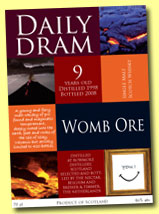 |
Bonus
– a relief we hope!
Womb Ore 9 yo 1998/2008 (46%, The
Nectar, Daily Dram, 420 bottles, Bowmore)
 Colour: straw. Nose: the first feeling
after all the 1989’s is that
this is much more ‘maritime’
and ‘medicinal’, and certainly
much, much cleaner. There’s
iodine, seashells, then grapefruits...
The ‘links’ with the older
versions are the notes of wet stones
and wet wool. We have also ashes,
apple peeling, fresh walnuts... There’s
some smoke but not a very big one.
Overall impression: very straight
and very pure. Mouth: it’s more
on the palate that the differences
with the older Bowmores are obvious.
This is much cleaner, much straighter.
Nice, sweet attack (kumquats that
remind me of the ‘Jack’),
the whole getting then rather drier.
Green apples, oatcakes, smoked fish,
marzipan, mastic and a slight saltiness.
Colour: straw. Nose: the first feeling
after all the 1989’s is that
this is much more ‘maritime’
and ‘medicinal’, and certainly
much, much cleaner. There’s
iodine, seashells, then grapefruits...
The ‘links’ with the older
versions are the notes of wet stones
and wet wool. We have also ashes,
apple peeling, fresh walnuts... There’s
some smoke but not a very big one.
Overall impression: very straight
and very pure. Mouth: it’s more
on the palate that the differences
with the older Bowmores are obvious.
This is much cleaner, much straighter.
Nice, sweet attack (kumquats that
remind me of the ‘Jack’),
the whole getting then rather drier.
Green apples, oatcakes, smoked fish,
marzipan, mastic and a slight saltiness.
|
| Finish:
long and a tad spicier now (cloves
and black pepper). Very slight cardboardiness.
Comments: much better than all the
1989’s for sure, and pretty
mature at just 9yo. Oh, and much more
‘Islay’. SGP:255
– 85 points. |
MUSIC
– Recommended listening.
French bluesman Paul
Personne does a very
good Où est le paradis?.mp3 (where's
paradise?) from his album Instantanés.
Please buy Paul Personne's music!
|
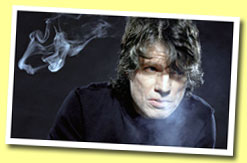 |
|
|
April
20, 2008 |
|
 |
| TASTING
– FIVE SINGLE GRAINS |
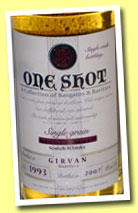 |
Girvan
1993/2007 (46%, Jean Boyer 'One Shot',
single cask)  Hmm, let’s see if this is any
better than owners William Grant’s
Black Barrel (as always, please read
‘more to my liking’.)
Colour: white wine. Nose: extremely
clean, pure and fresh but rather close
to plain spirit. Whiffs of strawberries
and rhubarb plus grass and a little
wood smoke. Kind of a super-Zubrovska,
probably excellent chilled, on caviar
(honest) or maybe smoked salmon. Mouth:
sweet and balanced. Again, not much
character I think, but there’s
much more oak than on the nose. Unusual
bitterness beyond the ‘plummish’
notes, herbs. Finish: medium long,
again on Zubrovska vodka. Or un-sugared
Chartreuse? Comments: maybe not the
best grain whisky ever, but certainly
the best vodka. Too bad caviar is
so expensive these days... SGP:550
– 78 points.
Hmm, let’s see if this is any
better than owners William Grant’s
Black Barrel (as always, please read
‘more to my liking’.)
Colour: white wine. Nose: extremely
clean, pure and fresh but rather close
to plain spirit. Whiffs of strawberries
and rhubarb plus grass and a little
wood smoke. Kind of a super-Zubrovska,
probably excellent chilled, on caviar
(honest) or maybe smoked salmon. Mouth:
sweet and balanced. Again, not much
character I think, but there’s
much more oak than on the nose. Unusual
bitterness beyond the ‘plummish’
notes, herbs. Finish: medium long,
again on Zubrovska vodka. Or un-sugared
Chartreuse? Comments: maybe not the
best grain whisky ever, but certainly
the best vodka. Too bad caviar is
so expensive these days... SGP:550
– 78 points. |
North
British 29 yo 1979/2008 (55.6%, Duncan
Taylor, cask #39890)
 North British always was interesting
to try, I think it’s usually
a grain that’s got rather more
character than others, albeit an often
‘twisted’ one. Colour:
pale straw. Nose: an even rawer spirit
than the Girvan at first nosing, getting
then closer to fruit eau-de-vie (plum
spirit). Three days old cut grass,
then a little coconut and vanilla
as often in these old grains. Something
animal as well (hare belly, as they
say in wine) and whiffs of roses and
cologne. As ‘twisted’
as expected, but is it good? Let’s
see what gives on the palate... Mouth:
very sweet, very flavourful, starting
all on coconut liqueur. You named
it, Malibu. Gets more on kirsch and
rum after that, and on pineapple liqueur...
Finish: long, maybe a tad prickly
now (oak). Comments: Caribbean! SGP:720
– 80 points.
North British always was interesting
to try, I think it’s usually
a grain that’s got rather more
character than others, albeit an often
‘twisted’ one. Colour:
pale straw. Nose: an even rawer spirit
than the Girvan at first nosing, getting
then closer to fruit eau-de-vie (plum
spirit). Three days old cut grass,
then a little coconut and vanilla
as often in these old grains. Something
animal as well (hare belly, as they
say in wine) and whiffs of roses and
cologne. As ‘twisted’
as expected, but is it good? Let’s
see what gives on the palate... Mouth:
very sweet, very flavourful, starting
all on coconut liqueur. You named
it, Malibu. Gets more on kirsch and
rum after that, and on pineapple liqueur...
Finish: long, maybe a tad prickly
now (oak). Comments: Caribbean! SGP:720
– 80 points. |
Strathclyde
33 yo 1973/2007 (56.5%, Duncan Taylor,
cask #74062)  I didn’t quite like cask #74060,
issued in 2005 (76) but cask #74063,
issued last year, was much better
in my book (83). Colour: pale gold.
Nose: much more classic than the North
British. Typical vanilla, grated coconut,
praline and coffee dregs. An unusual
meatiness as well in the background
(ham). Not really complex but very
pleasant, actually. Mouth: very classic!
Vanilla, coconut, nutmeg and black
tea. This time I feel the need to
add a little water, let’s see...
With water: (while the nose got more
on cornflakes): not really more complex
but more easily drinkable. Finish:
medium long, more on café latte
or this thing they make at Starbucks,
mixing milk, chocolate and hazelnuts.
Comments: sweet stuff, liquid vanilla
fudge. SGP:620 – 82
points.
I didn’t quite like cask #74060,
issued in 2005 (76) but cask #74063,
issued last year, was much better
in my book (83). Colour: pale gold.
Nose: much more classic than the North
British. Typical vanilla, grated coconut,
praline and coffee dregs. An unusual
meatiness as well in the background
(ham). Not really complex but very
pleasant, actually. Mouth: very classic!
Vanilla, coconut, nutmeg and black
tea. This time I feel the need to
add a little water, let’s see...
With water: (while the nose got more
on cornflakes): not really more complex
but more easily drinkable. Finish:
medium long, more on café latte
or this thing they make at Starbucks,
mixing milk, chocolate and hazelnuts.
Comments: sweet stuff, liquid vanilla
fudge. SGP:620 – 82
points. |
Cameronbridge
29 yo 1978/2008 (57%, Duncan Taylor,
cask #D5211)  Colour: pale gold. Nose: extremely
similar to the Strathclyde. Actually,
it’s more or less the same whisky.
Maybe just a tad more ‘roasted
and toasted’. With water: again,
pretty much in the same style as the
Strathclyde, and again, maybe just
a tad more caramelly and nutty. Mouth
(neat): fruitier than the Strathclyde
this time, and less vanilled/coffeeish.
Notes of strawberry liqueur. Now,
there’s still quite some vanilla
‘of course’. With water:
fruit spirit with traces of oak and
vanilla. Finish: more of the same.
Comments: it’s very good whisky
but is it interesting? Not for malt
lovers, I’d say. SGP:620
– 78 points.
Colour: pale gold. Nose: extremely
similar to the Strathclyde. Actually,
it’s more or less the same whisky.
Maybe just a tad more ‘roasted
and toasted’. With water: again,
pretty much in the same style as the
Strathclyde, and again, maybe just
a tad more caramelly and nutty. Mouth
(neat): fruitier than the Strathclyde
this time, and less vanilled/coffeeish.
Notes of strawberry liqueur. Now,
there’s still quite some vanilla
‘of course’. With water:
fruit spirit with traces of oak and
vanilla. Finish: more of the same.
Comments: it’s very good whisky
but is it interesting? Not for malt
lovers, I’d say. SGP:620
– 78 points. |
Carsebridge
27 yo 1979/2007 (60%, Duncan Taylor,
cask #32902)  I loved one of this one’s sister
casks (cask #32901, issued 2005, 90
points) so I have deep expectations
now. Colour: pale amber. Nose: almost
silent but that’s probably the
high ABV. Slightly fudgy. With water:
my, it’s hard to awaken this
one! Vanilla and coffee-flavoured
fudge. Wait, and very nice whiffs
of wet stones, chalk, even sea air.
This is rare in grain whisky, isn’t
it? Mouth (neat): hot but drinkable.
It seems that we’re more on
the second famous side of grain whiskies:
bubblegum and marshmallows. Now, it’s
very hot stuff so let’s not
try to swallow more than half a drop
of it. With water: ah yes, this is
rather good. Creamier, rounder, wider,
spicier... Peppered cappuccino with
a spurt of strawberry liqueur. Or
something like that. Finish: long,
more on coconuts now. Comments: not
one of these excellent Invergordons
distilled in the 60’s but still
a very good old grain – provided
you don’t forget to add a little
water. SGP:641 – 85
points.
I loved one of this one’s sister
casks (cask #32901, issued 2005, 90
points) so I have deep expectations
now. Colour: pale amber. Nose: almost
silent but that’s probably the
high ABV. Slightly fudgy. With water:
my, it’s hard to awaken this
one! Vanilla and coffee-flavoured
fudge. Wait, and very nice whiffs
of wet stones, chalk, even sea air.
This is rare in grain whisky, isn’t
it? Mouth (neat): hot but drinkable.
It seems that we’re more on
the second famous side of grain whiskies:
bubblegum and marshmallows. Now, it’s
very hot stuff so let’s not
try to swallow more than half a drop
of it. With water: ah yes, this is
rather good. Creamier, rounder, wider,
spicier... Peppered cappuccino with
a spurt of strawberry liqueur. Or
something like that. Finish: long,
more on coconuts now. Comments: not
one of these excellent Invergordons
distilled in the 60’s but still
a very good old grain – provided
you don’t forget to add a little
water. SGP:641 – 85
points. |
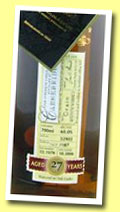 |
MUSIC
– Highly Recommended listening.
Don
Pullen was god. Please
listen to his piece called Indio
Gitano.mp3 and you'll see why
(it's on Blue Note' s Best Of).
And then please buy Don Pullen's
music! |
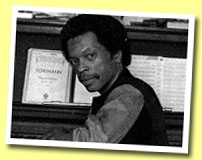 |
| |
April
18, 2008 |
|
 |
 |
|
|
MALT
MANIACS NEWSFLASH
by Olivier
THE NEW HIGHLAND PARK 40 YO
Highland
Park distillery has been releasing
recently a number of excellent
single casks and a wonderful
21yo. |
Shortage
of single malts produced in
the period 1995/1996 also means
that the regular 12yo contains
a higher proportion of older
malts, going back to some 27yo
casks. No whisky from this distillery
contains anymore caramel for
colour adjustment, which means
that the colour consistency
is achieved with older/sherry
casks in higher proportions.
Highland Park is also about
to release in April a 40yo at
48.3% as a regular non numbered
bottling. Retail price should
be around £899.
TASTING NOTES:
Highland
Park 40yo (48.3%, OB, 2008)
The colour is gold amber, not
tired at all. |
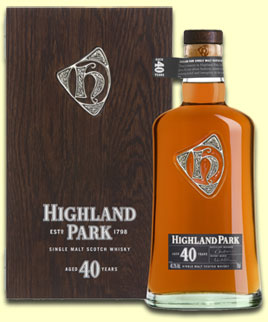 |
|
The nose exhibits intense fruity
aromas, underlined with the
typical heathery/peat character
that makes this distillery so
distinctive. Light creosote,
liquorice, apples, pears flavours,
heather, honey, raisins and
sherry notes all fight together
to reveal some stunning character.
The palate is more peaty than
the 25yo or 30yo official release.
It feels almost medicinal/organic
and definitely maritime, very
long and powerful (amazing strength
for a 40yo!). The sherry influence
is great. Some light sulphurs
bring some gunflint flavours.
Of course there is also some
oak on the finish, but it feels
nicely integrated. I would call
this whisky a masterpiece and
can only salute the work of
the team at Highland Park that
crafted this bottling. Perhaps
there are a couple of 'emotional'
points included in my 96pts
rating, but there is nothing
I would add or take away from
this whisky.- Olivier Humbrecht |
|
| |
April
17, 2008 |
|
 |
 |
|
|
MALT
MANIACS NEWSFLASH
URGENT - NEW POLL ABOUT THE
'BLENDED MALT' APPELLATION
|
It's
at http://www.harpers.co.uk.
Many MM's have already cast
their votes and the 'no' votes
were at 75% this morning.
And then, suddently, the number
started to drop quite dramatically
within minutes, down to 70%.
Johannes sent an alert and
at time of writing it's back
to 74%... But you could still
add your own vote and confirm
all this. Watch for this space
on Harper's homepage (image
at the right).
13:44
Update: it seems that the
poll is over. Final results:
NO: 75%
YES:
20%
DUNNO: 3%
(I'm too drunk to even
vote: 2% ;-)) |
 |
| Curious
about what the SWA will make
out of this... |
| By
the way, Malt Maniacs
#109 is online!!
Excellent read... |
|
CONCERT
REVIEW by Nick Morgan
JON CLEARY AND THE ABSOLUTE MONSTER
GENTLEMEN |
The
100 Club, London
April 6th 2008
I
don’t want to sound like a
broken record, but although it’s
officially British Summer Time it’s
been snowing in London for much
of the day (more misery at our brave
new Terminal 5) and it is simply
freezing cold. I reckon it’s
about twenty-five degrees in New
Orleans, so it will be interesting
to see how much of the heat Englishman
John
Cleary, for many years
a N'awlins resident, has brought
with him from the Big Easy. |
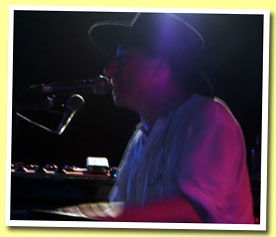 |
| He’s
a busy man. Perhaps best known as
pianist and composer for Taj
Mahal, he’s in the middle
of a short European tour with his
band the Absolute Monster Gentlemen,
getting back home, I’m very
glad to say, in time for a gig at
the Tulane Crawfish Boil (mmm!). He’s
then touring as pianist with Bonnie
Raitt before returning with his
band to Europe and in particular London
in the summer, when he’ll be
playing a gig at the ghastly Pigalle
Club. Maybe he likes to come over
to see his family – he was born
in the picturesque village of Cranbrook
in Kent not far from London. And in
fact I wonder if the reason that the
place is so packed isn’t because
half his family are crammed with us
into the 100 Club. It’s certainly
a big crowd for a ‘little known’
(my assumption) artist, with a surprisingly
young and feminine feel to it. |
| The
Absolute Monster Gentlemen are Cornell
C Williams on bass, the wonderfully
syncopated Eddie Christmas on drums,
and on (mostly) Fender Telecaster,
Derwin ‘Big D’ Perkins,
who without being disrespectful is
not the sort of guy you’d like
to see taking the seat next to yours
on a ‘plane (or a bus, cinema,
park bench etc.). On a serious note
– his size does not prepare
you for the delicacy of his playing,
particularly on the Caribbean and
calypso infused ‘Zulu Strut’
(which can be found on Cleary’s
2004 album Pin Your Spin) where he
duets with Cleary on guitar, or during
his big solo on ‘Help me somebody’.
But for the most part he plays behind
Cleary who leads with his forceful
keyboards which display a variety
of influences from the classical New
Orleans style of Professor Longhair
through to more contemporary R&B.
We get one Taj Mahal tune –
‘21st Century Gypsy singin’
lover man’, which Cleary co-wrote,
but sadly not the wonderful ‘Cheatin’
on you’, which he also wrote.
And as the band play they swing from
New Orleans stomp-style such as ‘Go
to the Mardi Gras’ to a more
accomplished Average White Band, particularly
with Big D’s backing vocals
to Cleary’s gravelly lead. |
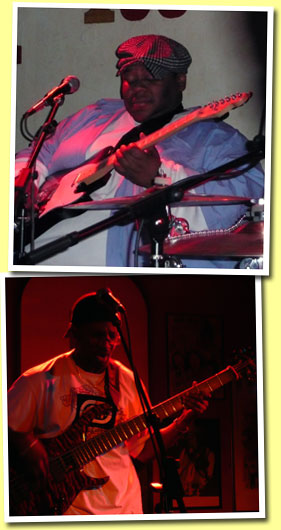
Derwin ‘Big D’ Perkins
and Cornell C Williams |
| Needless
to say Christmas’s drumming
was at the heart of almost everything,
and was showcased, appropriately enough,
on ‘Second line’. |
|
By
this time the temperature had been
predictably over-adjusted, so the
evening ended with us wading in pools
of sweat and beer as Cleary finished
with ‘Help me somebody’,
‘Groove me’, and ‘When
you get back’, all of which,
in the very same order, can be found
on his new (and recommended) live
album ‘Mo hippa’. And
it was then that something very strange
happened. With an audience totally
engrossed in the music no one noticed
the phalanx of burly blue-track-suited
Chinese guys who jogged down the stairs,
with what looked like promoter Jim
Driver in their midst clutching a
flaming torch, pushed past the backs
of the crowd and out through the fire-exit
by the entrance to the malodorous
Gent’s urinals. Stranger than
truth? Hardly. - Nick Morgan (photographs
by Kate) |
 |
|
|
MALT
MANIACS NEWSFLASH
by Davin
BOOK PREVIEW
Japanese
Whisky - Facts, Figures and
Taste,
Buxrud, Ulf
to be published 2008. |
|
The most unique whisky book
released in the past few years
has got to be Ulf Buxrud's Rare
Malts, a coffee table quality
documentation of a single series
of collectors' whiskies. Well,
Buxrud is at it again, this
time filling an as yet unexplored
niche with the first English-language
guide to Japanese distilleries
and their whiskies. It's about
time someone wrote this book,
and if early drafts reviewed
for Whiskyfun are any indication
Buxrud has done an admirable
job. Beginning with a history
of the Japanese cratur that
precedes Shinjiro Torii and
Masataka Taketsuru, he moves
on to a distillery-by-distillery
tour with specifications, tastings,
travel tips and side excursions.
This is no esoteric adventure,
as his first outing was. |
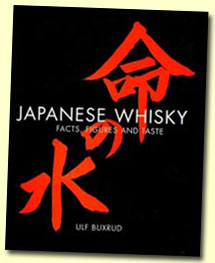 |
| Rather
Japanese Whisky - Facts, Figures
and Taste is a comprehensive
guide to Japanese whisky written
for the interested consumer
and visitor alike. Final production
is underway now with release
scheduled for later this year.
A full review will follow on
Maltmaniacs.com . - Davin
de Kergommeaux |
|
| TASTING
– TWO OLD GLENBURGIES |
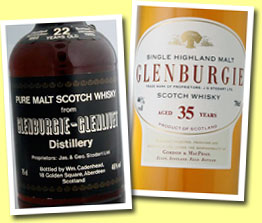 |
Glenburgie-Glenlivet
22yo 1962/1985 (46%, Cadenhead's Dumpy,
Black Label, 75cl)  Colour: straw. Nose: this one is really
mutli-layered. Starts on honey and
pollen, gets then sort of smoky (barbecue),
then very grassy and even a little
acrid, and finally quite meaty (sausages,
ham, tallow). Also notes of cabbage
and asparagus. It’s moving to
try such an old whisky but frankly,
this time it’s not really a
thrill. Too grassy a malt for me,
even if it gets very almondy after
a while, which I usually like.
Colour: straw. Nose: this one is really
mutli-layered. Starts on honey and
pollen, gets then sort of smoky (barbecue),
then very grassy and even a little
acrid, and finally quite meaty (sausages,
ham, tallow). Also notes of cabbage
and asparagus. It’s moving to
try such an old whisky but frankly,
this time it’s not really a
thrill. Too grassy a malt for me,
even if it gets very almondy after
a while, which I usually like. |
| Mouth:
the attack is good, on walnuts and
resin but then there’s something
strange that happens. It gets rough,
‘green’, curiously papery
and beefy at the same time... Not
sure there wasn’t a flaw originally,
a flaw that mingled with the rest
through the years but not quite. Nails?
Too bad, some aspects of this one
are very nice, especially the mint
and liquorice. Finish: long, very
minty now, with the flawed parts having
vanished a bit. Not unlike when you
just had a handful of mint drops.
Comments: it’s hard to make
up my mind about this one. The big
mintiness on the palate is spectacular
but there are some flaws... Well,
who cares, such an old bottle! SGP:251
- 79 points. |
Glenburgie
35 yo (46%, Gordon & MacPhail,
distillery label, circa 2007)
 Colour: pale gold. Nose: it’s
hard to believe that this comes from
the same distillery – or are
G&M’s warehouses that good?
Much more delicate, subtle, superbly
honeyed (it’s more honeydew
actually) and citrusy (kumquats, orange
marmalade), starting to smell like
these spices we use to prepare mulled
wine (Chinese anise, cloves, cinnamon...)
Also something delicately herbal,
mint, leather, cigarette tobacco...
Faint whiffs of diesel oil. Not a
big whisky for sure but it’s
very elegant. One for Epsom (nah,
not Epson). Mouth: oh, some parts
of the Cadenhead’s are back
again, especially the mint and the
‘greenish’ part, except
that they’re much better integrated
here. Quite some lemon, dried grapefruits,
old walnuts, liquorice, cloves...
Quite some tannins as well, even green
ones, but curiously, all that is pleasant.
Chlorophyll. Finish: long, ‘greener’
and more vegetal but still very good.
A very good old walnut liqueur? Comments:
good stuff. It’s truly amazing
to see how G&M made huge progress
once they decided to bottle more old
whiskies at 43 or 46% instead of 40%.
Actually, it’s not just an impression,
I calculated their general average
from the Malt Maniacs Monitor and
believe me, they gained quite a few
points since last year. SGP:461
– 89 points (and
thanks, Alain).
Colour: pale gold. Nose: it’s
hard to believe that this comes from
the same distillery – or are
G&M’s warehouses that good?
Much more delicate, subtle, superbly
honeyed (it’s more honeydew
actually) and citrusy (kumquats, orange
marmalade), starting to smell like
these spices we use to prepare mulled
wine (Chinese anise, cloves, cinnamon...)
Also something delicately herbal,
mint, leather, cigarette tobacco...
Faint whiffs of diesel oil. Not a
big whisky for sure but it’s
very elegant. One for Epsom (nah,
not Epson). Mouth: oh, some parts
of the Cadenhead’s are back
again, especially the mint and the
‘greenish’ part, except
that they’re much better integrated
here. Quite some lemon, dried grapefruits,
old walnuts, liquorice, cloves...
Quite some tannins as well, even green
ones, but curiously, all that is pleasant.
Chlorophyll. Finish: long, ‘greener’
and more vegetal but still very good.
A very good old walnut liqueur? Comments:
good stuff. It’s truly amazing
to see how G&M made huge progress
once they decided to bottle more old
whiskies at 43 or 46% instead of 40%.
Actually, it’s not just an impression,
I calculated their general average
from the Malt Maniacs Monitor and
believe me, they gained quite a few
points since last year. SGP:461
– 89 points (and
thanks, Alain). |
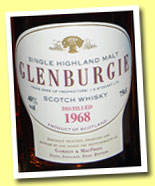 |
And
also Glenburgie 1968 (40%, Gordon
& MacPhail, circa 1990)
 Nose: fresh but a little feinty and
not so pleasantly dry. Porridge, grass...
Slightly flat. Mouth: wood glue, grains,
apple juice and soft paprika. Finish:
medium, not much character. Comments:
better as it sounds but in no way
in the same league as the recent 35.
SGP:231 – 78 points.
Nose: fresh but a little feinty and
not so pleasantly dry. Porridge, grass...
Slightly flat. Mouth: wood glue, grains,
apple juice and soft paprika. Finish:
medium, not much character. Comments:
better as it sounds but in no way
in the same league as the recent 35.
SGP:231 – 78 points. |
| |
April
16, 2008 |
|
 |
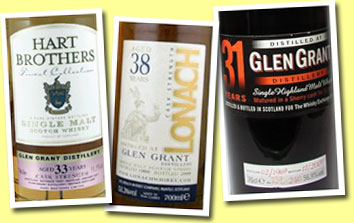 |
TASTING
– THREE 1969 GLEN GRANTS
Maybe
you would think it would get boring
to try old these old Glen Grants
– please be sure it’s
not! |
Glen
Grant 33 yo 1969 (51.5%, Hart Bros)
 Colour: straw. Nose: yes, not a drop
of sherry this time, rather big porridgy
notes, mashed potatoes, apple peeling
and fresh walnuts and almonds. Add
to that pretty big whiffs of newly
mown lawn, hay and green tea and you’ll
get the general feeling. No signs
of age I must say. Paraffin. Mouth:
how old is this? Ten years old? Fifteen?
Very grassy, grainy, porridgy, getting
then tannic and drying. The ‘background’
is nice, that is, with notes of green
apples and almonds. Other than that...
Finish: not too long and very grassy,
with crystallised oranges making a
very late arrival. Comments: let’s
be diplomatic: we’ve had better
ones. SGP:261 – 77 points.
Colour: straw. Nose: yes, not a drop
of sherry this time, rather big porridgy
notes, mashed potatoes, apple peeling
and fresh walnuts and almonds. Add
to that pretty big whiffs of newly
mown lawn, hay and green tea and you’ll
get the general feeling. No signs
of age I must say. Paraffin. Mouth:
how old is this? Ten years old? Fifteen?
Very grassy, grainy, porridgy, getting
then tannic and drying. The ‘background’
is nice, that is, with notes of green
apples and almonds. Other than that...
Finish: not too long and very grassy,
with crystallised oranges making a
very late arrival. Comments: let’s
be diplomatic: we’ve had better
ones. SGP:261 – 77 points. |
Glen
Grant 38 yo 1969/2008 (52.3%, Duncan
Taylor, Lonach Collection)  another one from Duncan Taylor’s
low cost collection, now with a new
(nicer we think) livery. We’ve
already come across some very good
ones I must say. Colour: gold. Nose:
yup, interesting, as it really smells
like cold earl grey tea at first nosing.
Goes on on apple compote and many
other things made out of apples (like,
err, pies), walnuts, wet wood, fresh
almonds... Then big notes of fresh
orange juice. Rather close to the
Hart Bros, only much more expressive.
Mouth: again, this is interesting.
The general profile is similar to
the HB’s again, just much more
expressive. Funny hints of Comté
cheese (my fav’), then big ‘minty’
oak, tea, liquorice sticks, almonds...
Big tannins but rather pleasant ones.
Finish: long, on tannins and mint.
Yes, even more mint – and liquorice.
Comments: big oak, but of rather high
quality. For oak lovers only, I’d
say. SGP:371 – 86 points.
another one from Duncan Taylor’s
low cost collection, now with a new
(nicer we think) livery. We’ve
already come across some very good
ones I must say. Colour: gold. Nose:
yup, interesting, as it really smells
like cold earl grey tea at first nosing.
Goes on on apple compote and many
other things made out of apples (like,
err, pies), walnuts, wet wood, fresh
almonds... Then big notes of fresh
orange juice. Rather close to the
Hart Bros, only much more expressive.
Mouth: again, this is interesting.
The general profile is similar to
the HB’s again, just much more
expressive. Funny hints of Comté
cheese (my fav’), then big ‘minty’
oak, tea, liquorice sticks, almonds...
Big tannins but rather pleasant ones.
Finish: long, on tannins and mint.
Yes, even more mint – and liquorice.
Comments: big oak, but of rather high
quality. For oak lovers only, I’d
say. SGP:371 – 86 points. |
Glen
Grant 31 yo 1969/2000 (56.9%, The
Whisky Exchange, 240 bottles)
 Colour: mahogany (I’ll eat my
hat when this is not sherry). Nose:
yeah, my hat is safe. Very, very classic
dry-sherried old whisky, starting
all on bitter chocolate, wood smoke
and leather. Stays on these aromas
for a while, and then the cavalry
arrives! Dried oranges, ginger, cigar
box, game, soy sauce, prunes, balsamic
vinegar, black cherries, high-end
oak, high-end varnish... And tons
of other micro-aromas. Entrancing
whisky, and not the tiniest whiff
of sulphur. Exceptional, really. With
water: Mouth: holy featherless crow!
This is very sherried again, but in
a different style than on the nose.
Much more on Asiatic fruit sauces,
fruit jams and a rather extreme old
‘rancio’. The sherry itself
is very obvious but it’s a beautiful
one, thick, creamy, coating, luscious...
Finish: long like a Tyrolean yodeling
(WTF?). Comments: some must have invented
the word ‘concentrated’
just for this whisky; you might have
to brush your teeth after having sipped
a glass of this ‘cream’.
SGP:762 – 92 points.
(thank you Konstantin –
liked the Tyrolean bit?)
Colour: mahogany (I’ll eat my
hat when this is not sherry). Nose:
yeah, my hat is safe. Very, very classic
dry-sherried old whisky, starting
all on bitter chocolate, wood smoke
and leather. Stays on these aromas
for a while, and then the cavalry
arrives! Dried oranges, ginger, cigar
box, game, soy sauce, prunes, balsamic
vinegar, black cherries, high-end
oak, high-end varnish... And tons
of other micro-aromas. Entrancing
whisky, and not the tiniest whiff
of sulphur. Exceptional, really. With
water: Mouth: holy featherless crow!
This is very sherried again, but in
a different style than on the nose.
Much more on Asiatic fruit sauces,
fruit jams and a rather extreme old
‘rancio’. The sherry itself
is very obvious but it’s a beautiful
one, thick, creamy, coating, luscious...
Finish: long like a Tyrolean yodeling
(WTF?). Comments: some must have invented
the word ‘concentrated’
just for this whisky; you might have
to brush your teeth after having sipped
a glass of this ‘cream’.
SGP:762 – 92 points.
(thank you Konstantin –
liked the Tyrolean bit?) |
MUSIC
– Recommended listening.
Classic blues by the late 'blues
crooner' Johnny
Heartsman: The
sky is crying.mp3. Please do
what you should do. |
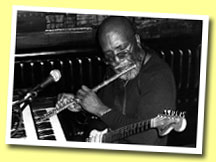 |
| |
April
15, 2008 |
|
 |
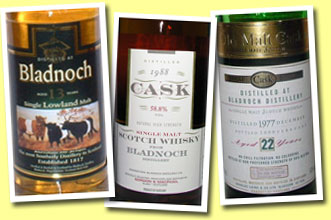 |
TASTING
– A SHORT BLADNOCH VERTICALE |
Bladnoch 13 yo (55%, OB, 2005)
 Colour: pale gold. Nose: powerful,
starting mostly on grains, porridge
and muesli, maybe not extraordinarily
‘Bladnoch’ so to speak,
but it really takes off after a few
minutes, getting much more citrusy
(lemon first, then citron and grapefruit)
and rather delicately floral beyond
that (lilac). Slightly fizzy –
gets back to porridgy notes after
a while. Now, it seems that it’s
got more to tell us... With water:
it’s the farmier side that comes
more to the front (hay, wet grains)
but the lemons are still here. Wilder
lemons? Mouth (neat): a big, fruity
punch at the attack, fresh and rightly
lemony. Lemon marmalade, lemon drops,
lemon juice... Well, all things lemon,
really. A little hot but rather sippable
I must say. Now, with water: it got
sort of salty, very fresh now, riesling-alike
so to speak (excuse my Alsatian-ness).
Finish: rather long, clean, citrusy,
with hints of gentian and a slight
maltiness. Comments: I simply like
this. Very clean spirit. SGP:641
– 86 points.
Colour: pale gold. Nose: powerful,
starting mostly on grains, porridge
and muesli, maybe not extraordinarily
‘Bladnoch’ so to speak,
but it really takes off after a few
minutes, getting much more citrusy
(lemon first, then citron and grapefruit)
and rather delicately floral beyond
that (lilac). Slightly fizzy –
gets back to porridgy notes after
a while. Now, it seems that it’s
got more to tell us... With water:
it’s the farmier side that comes
more to the front (hay, wet grains)
but the lemons are still here. Wilder
lemons? Mouth (neat): a big, fruity
punch at the attack, fresh and rightly
lemony. Lemon marmalade, lemon drops,
lemon juice... Well, all things lemon,
really. A little hot but rather sippable
I must say. Now, with water: it got
sort of salty, very fresh now, riesling-alike
so to speak (excuse my Alsatian-ness).
Finish: rather long, clean, citrusy,
with hints of gentian and a slight
maltiness. Comments: I simply like
this. Very clean spirit. SGP:641
– 86 points. |
Bladnoch
1988/2000 (58.8%, Gordon & MacPhail
‘Cask’, casks #3151 –
3158)  Colour: deep gold.
Nose: much more cask influence in
this one it seems. Starts on cooked
butter, croutons, with the lemony
notes well there in the background.
Alas, gets a little acidic and sour,
not unlike some dry whites (it ‘sauvignonises’).
Sour cream, apple vinegar, vase water...
Something not quite clean in this
cask – it’s not the spirit.
And something ‘malolactic’.
Maybe one or two sherry casks that
were, well, so-so. With water: even
more vinegar-like for a while but
gets then a little cleaner. Very overripe
oranges. Mouth (neat): sweet, punchy,
better balanced than on the nose when
naked (my, imagine somebody would
read this while not knowing we’re
talking ‘bout whisky!) but getting
a little too bubblegummy this time.
Big notes of fruit spirit (plums),
of the wild kind. Kind of a bitterness
in the background (bitter herbs).
With water: gets a little cardboardy,
even after good ten minutes. Also
a little salt again, like in the OB.
Finish: long, really better now (pleasant
lemony notes) but it’s a little
late... Comments: not too bad actually,
but at similar age, the OB was much
nicer I think. SGP:551 –
77 points.
Colour: deep gold.
Nose: much more cask influence in
this one it seems. Starts on cooked
butter, croutons, with the lemony
notes well there in the background.
Alas, gets a little acidic and sour,
not unlike some dry whites (it ‘sauvignonises’).
Sour cream, apple vinegar, vase water...
Something not quite clean in this
cask – it’s not the spirit.
And something ‘malolactic’.
Maybe one or two sherry casks that
were, well, so-so. With water: even
more vinegar-like for a while but
gets then a little cleaner. Very overripe
oranges. Mouth (neat): sweet, punchy,
better balanced than on the nose when
naked (my, imagine somebody would
read this while not knowing we’re
talking ‘bout whisky!) but getting
a little too bubblegummy this time.
Big notes of fruit spirit (plums),
of the wild kind. Kind of a bitterness
in the background (bitter herbs).
With water: gets a little cardboardy,
even after good ten minutes. Also
a little salt again, like in the OB.
Finish: long, really better now (pleasant
lemony notes) but it’s a little
late... Comments: not too bad actually,
but at similar age, the OB was much
nicer I think. SGP:551 –
77 points. |
Bladnoch
22 yo 1977/2000 (50%, Douglas Laing
OMC, 286 bottles)
 Colour: gold. Nose: much cleaner than
the G&M at first nosing, and obviously
more lemony and ‘globally’
citrusy (kumquats), with also whiffs
of eucalyptus leaves and fresh mint
and even camphor. Really beautiful
but alas, there’s something
not quite ‘clean’ again
developing after a moment. Wet newspapers,
wet old wood, mouldiness (old cellar).
Not that it’s totally unpleasant,
that is, it’s just that we’d
have liked this one to be ‘straighter’,
just like it started. With water:
the mint and eucalyptus get bigger
again, which is good news, but tthere’s
also a slightly disturbing soapiness
that persists (not just after watering
down). Mouth (neat): way better than
at first nosing. Great notes of verbena
and mint and then lemon balm and,
again, all things lemony. Very good!
With water: yes, very good... Gets
more herbal, earl grey tea, verbena,
camomile, rosehip teas... Finish:
long but maybe a tad boo bitter now.
Heavy notes of chlorophyll. Comments:
big contrast between nose and palate
in this one. SGP:471 –
78 points.
Colour: gold. Nose: much cleaner than
the G&M at first nosing, and obviously
more lemony and ‘globally’
citrusy (kumquats), with also whiffs
of eucalyptus leaves and fresh mint
and even camphor. Really beautiful
but alas, there’s something
not quite ‘clean’ again
developing after a moment. Wet newspapers,
wet old wood, mouldiness (old cellar).
Not that it’s totally unpleasant,
that is, it’s just that we’d
have liked this one to be ‘straighter’,
just like it started. With water:
the mint and eucalyptus get bigger
again, which is good news, but tthere’s
also a slightly disturbing soapiness
that persists (not just after watering
down). Mouth (neat): way better than
at first nosing. Great notes of verbena
and mint and then lemon balm and,
again, all things lemony. Very good!
With water: yes, very good... Gets
more herbal, earl grey tea, verbena,
camomile, rosehip teas... Finish:
long but maybe a tad boo bitter now.
Heavy notes of chlorophyll. Comments:
big contrast between nose and palate
in this one. SGP:471 –
78 points. |
Bladnoch
13 yo 1964/1977 (80°proof, Cadenhead’s
dumpy)  Bladnoch had only two stills in 1964
(they added two in 1966). Colour:
amber. Nose: superb this time. Bladnoch’s
‘citrusness’ is well here
right upfront, coated with beautiful
notes of old sherry and a most delightful
OBE. Something like a blend of shoe
polish, orange marmalade, walnut liqueur,
thuja wood and old silverware. Very
‘antique’ indeed and truly
lovable. Mouth: oh yes, this is good.
Again, something ‘antique’...
Old nuts, marzipan, mastic, liquorice...
It’s amazing how this one remained
big and punchy through all these 30
years in glass. Does brown glass make
it better? Goes on with notes of old
rancio, very old Modena vinegar, something
waxy, honeydew... This is superb.
Finish: maybe not the longest but
it’s superb, doing the ‘peacock’s
tail’ around notes of high-end
orange marmalade (from waxy, mineral
notes to aromatic herbs). Benedictine
from a good vintage ;-). Comments:
it seems that bottle ageing suits
Bladnoch well. Good good good! SGP:552
- 91 points.
Bladnoch had only two stills in 1964
(they added two in 1966). Colour:
amber. Nose: superb this time. Bladnoch’s
‘citrusness’ is well here
right upfront, coated with beautiful
notes of old sherry and a most delightful
OBE. Something like a blend of shoe
polish, orange marmalade, walnut liqueur,
thuja wood and old silverware. Very
‘antique’ indeed and truly
lovable. Mouth: oh yes, this is good.
Again, something ‘antique’...
Old nuts, marzipan, mastic, liquorice...
It’s amazing how this one remained
big and punchy through all these 30
years in glass. Does brown glass make
it better? Goes on with notes of old
rancio, very old Modena vinegar, something
waxy, honeydew... This is superb.
Finish: maybe not the longest but
it’s superb, doing the ‘peacock’s
tail’ around notes of high-end
orange marmalade (from waxy, mineral
notes to aromatic herbs). Benedictine
from a good vintage ;-). Comments:
it seems that bottle ageing suits
Bladnoch well. Good good good! SGP:552
- 91 points. |
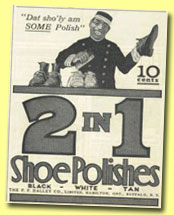 |
| PETE
McPEAT AND JACK WASHBACK |
| MUSIC
– Recommended listening.
A little bit of jaz again, with
Leonie
Smith singing Angel
eyes.mp3. Please buy Leonie
Smith's music! |
 |
Check
the index of all entries:
Whisky
Music
Nick's Concert
Reviews
|
 |
 |
 |
|
| |
Best
malts I had these weeks - 90+
points only - alphabetical:
Bladnoch
13 yo 1964/1977 (80°proof,
Cadenhead’s dumpy)
Glen
Grant 31 yo 1969/2000 (56.9%, The Whisky
Exchange, 240 bottles)
Inchmurrin
34 yo 1967/2001 (45.3%, OB for Sweden,
Part Nan Angelen, 1800 bottles)
Rosebank
20 yo (57%, OB,
Distillers Agency, Zenith, clear glass, 2580
bottles)
Rosebank
1967/1994 (51.7%, Scotch Single Malt
Circle, cask #4398)


|
| |
|
|

